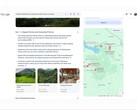The stable release of Android 16 is a few months off yet. Nonetheless, public beta versions have revealed a few innovations that are in the works. For example, it seems that Google's long-awaited desktop mode could finally arrive with Android 16, as could a change that may reduce boot times by up to 30%. Also, the company is working to deliver the option of using fingerprint authentication even with a Pixel's display is inactive.
On top of that, Redditors have discovered substantial performance improvements in Geekbench 6's GPU benchmark testing across the board from the Pixel 6a to the latest Pixel 9 Pro (curr. $849 on Amazon) and everything in between. Specifically, the humble Pixel 7a has now been observed going toe-to-toe with Google's current flagships. Initially, this was attributed to the work that Google has made within Android 16.
With that being said, Android Authority and others have determined that these performance gains are not tied to Android 16. Instead, this performance uplift has been achieved via new GPU drivers that apparently started shipping with Android 15 QPR2, which Google released earlier this month. Thus, any Tensor-powered Pixel device should benefit from a performance boost. However, this will only be true in applications optimised for the Vulkan graphics API, such as Geekbench 6's GPU benchmark test.




























